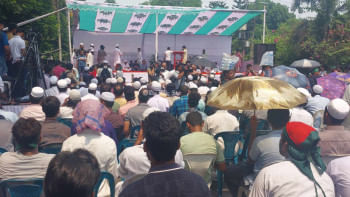BRAIN GAIN
 Everyone wants to be successful and get there fast. Therefore, it was no surprise when large groups of high school graduates from the South and East Asia were moving to the West, initially to pursue higher education and sooner than later, to settle there. The trend reached its peak in the 1980s. While India and China have found clever ways to bring their bright and brilliant people back, Bangladesh is slowly climbing up the ladder. Starting from entrepreneurs to artists who would like to go beyond the niche to try their luck with our economy to young people who are opting to invest their talents locally, our system is trying to encourage the youth -- regardless of differing hairstyles and taste in music -- to come back.
Everyone wants to be successful and get there fast. Therefore, it was no surprise when large groups of high school graduates from the South and East Asia were moving to the West, initially to pursue higher education and sooner than later, to settle there. The trend reached its peak in the 1980s. While India and China have found clever ways to bring their bright and brilliant people back, Bangladesh is slowly climbing up the ladder. Starting from entrepreneurs to artists who would like to go beyond the niche to try their luck with our economy to young people who are opting to invest their talents locally, our system is trying to encourage the youth -- regardless of differing hairstyles and taste in music -- to come back.
Ishnad Chowdhury comes from the lot of the mega spirited. With both Bachelor's and Master's degrees in Finance from University of Arizona (2009) and Villanova University (2011) respectively, it comes as a surprise that Ishnad and his cousin decided to embark on an adventure-focused startup in Bangladesh. On returning home and traveling extensively, they felt Bangladesh lacked entertainment opportunities except for going to restaurants and cafes. They started Fun Fest, an adventure 'sports' startup in Cox's Bazar that lets you parasail, land sail and go Captain Jack Sparrow with the crashing waves on the beach. The challenges, as Ishnad points out was convincing people, especially government officials, to get a permit on the idea of 'adventure' and its potential with drawing tourists to Cox's Bazar, but once sold, Fun Fest took off with a swing.
“My advice to people who want to come back would be to find the mismatches between abroad and Bangladesh, and just capitalise on it,” says Ishnad. “Being an entrepreneur is the best thing you can be in Bangladesh!”
Rubayat Khan, a graduate from the Department of Environmental Science and Management at Independent University Bangladesh, who later went to Harvard University to pursue a Master's in Public Administration/International Development says it was a combination of his experiences at both ends of the world that convinced him to return to Bangladesh to do something. He returned to work with mPower, a social enterprise he co-founded four years earlier, and says it was his experience while setting the enterprise up that helped him pursue his graduate studies, and not the other way round.
“My time abroad helped me gain analytical skills that I can implement while working with mPower,” says Rubayat. “But, it is important to understand that Bangladesh is a goldmine of opportunities and there is a huge untapped domestic market. The skills gained abroad are in short supply here, and you could be more successful with your work and dreams here than you could ever be in the West, all the while feeling proud of being able to do something for your own country.”
Mridul Chowdhury, Founder and CEO of mPower, completed his Master's degree in International Development from Harvard University in 2008. “The challenge is getting past traffic jams,” says Mridul. “My time abroad got me into the habit of walking, and I learnt no jam is jammed enough.”
Opportunities here, opportunities there. The trick is to know what you want to do. Maimuna Ahmad, Founder at Teach for Bangladesh says she spent some time soul searching whether Bangladesh was the right place to implement her ideas before jumping to start something.
“I spent a lot of time traveling and understanding ground realities before pursuing my idea,” says Maimuna. “I think that experience added great value, and in spite of the discouragement, helped me take a leap of faith and do something for Bangladesh.”


 For all latest news, follow The Daily Star's Google News channel.
For all latest news, follow The Daily Star's Google News channel. 






Comments